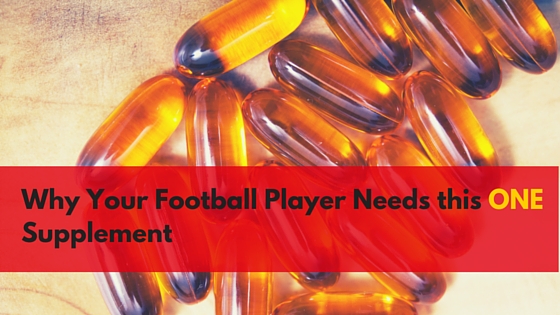This Supplement May Help Protect the Brain in a Concussion

Read Time: [7-8 minutes]
I’ve talked a lot about concussions and repetitive head trauma on the blog. While my expertise is mainly in the consequences that head trauma has on the neck, I always like to keep an ear out for easy and evidence-based therapies that may be able to help people that are at the highest risk of head injury. One of the easiest and most beneficial things that someone can do is to get adequate omega-3 fatty acids.
A study published recently in Medicine & Science in Sports and Exercise examined a large group of college football players to see if a specific omega-3 fatty acid could possibly help protect football players from the effects of head trauma. The results hold promise as an easy intervention that can possibly reduce some of the damage from head injuries. Why is it important?
Because a 2013 study showed that 1 year of playing varsity football in high school can show damage to the axons of the brain even WITHOUT a concussion. That means that a high school football player’s brain can look like a concussed brain even without ever having a clinical concussion diagnosis.[Source]
That means that a high school football player’s brain can look like a concussed brain even without ever having a clinical concussion diagnosis.
DHA – The Brain Builder
Docosahexaenoic acid or DHA is the name of a specific type of omega-3 fatty acid. When we think Omega-3, we often think about fish oil, flaxseed oil, or your most recent batch of enriched organic eggs.
However, not all omega 3’s are the same. There are 2 main types that are most useful to humans. Many of the anti-inflammatory and heart health benefits from omega 3’s are from a compound called eicosapantanoic acid or EPA. DHA on the other hand plays a major role in the health of the brain.
Why brain health? Because DHA’s are the building blocks for the outer covering of our brain cells. This outer covering is called the cell membrane and is composed of a double layer of fats with various proteins and carbohydrates embedded throughout.
The cell membrane acts like the bouncer of a bar or club. It selects who gets to enter the cell and have a good time, and it rejects anything that it deems is unfit. There’s no place in the body where this barrier system is as important as your brain. When your brain cells have bad cell membranes, than the cell ceases to function as it was designed.

DHA is so important for brain development, that one of the richest sources for DHA is found in a mother’s breast milk. DHA is the primary fatty acid used by the brain during infant brain development, and it continues to play a role in adult brains. Some of the conditions that have benefitted from DHA supplementation include:
- Mild cognitive impairment
- Depression
- ADHD
But Can It Really Help With Head Trauma?
It’s still early to tell, but it seems promising. Scientists originally studied this effect in rats (For some strange reason, rats keep signing up to get their brains traumatized), and the rats fed DHA showed significantly less damage to their brain compared to normally fed rats. [Source]
In this study involving college football players, the scientists looked for a marker called Neurofilament light (NFL….interesting coincidence there). The presence of NFL in the blood or cerebral spinal fluid is a marker found in boxers, NFL players, and others who engage in frequent head contact. It’s a sign that the axons in the brain have been subjected to damage.
The good news? Players that took just 2 grams of DHA per day showed significantly less NFL in their blood. While we can’t tell for sure if their brains are less damaged, but it’s a good start in replicating the same things we saw in rats!
By providing an abundance of DHA for the brain, a traumatic blow to the head has the extra building material to help repair some of the damage done to the cell. We also know that DHA has a therapeutic potential in controlling inflammation in the blood and the brain as well.
Should You Supplement?
It’s still too early to start supplementing with DHA for the sole purpose of protecting against brain injury. There’s good news though. One of the benefits of DHA supplementation is that it is well tolerated by most people. Even if it doesn’t help with brain injury, there are plenty of benefits to taking an omega 3 fatty acid like DHA because most people are very deficient in this essential nutrient. It would probably work even better by eating DHA rich foods like salmon or sardines multiple times per week.
My take away?
If you are playing a contact sport like football or mixed martial arts, your brain may get some protection from repeated head trauma by taking 2 grams of DHA/day during the season. Worse case scenario is that your brain and body will see some side-benefits from taking this vital nutrient even if it has no effect on head injury.





Leave a Reply
Want to join the discussion?Feel free to contribute!